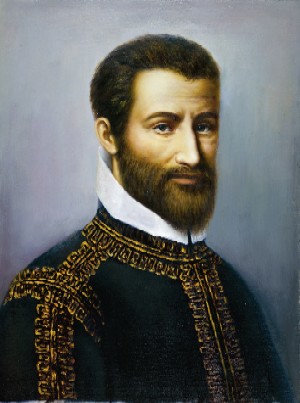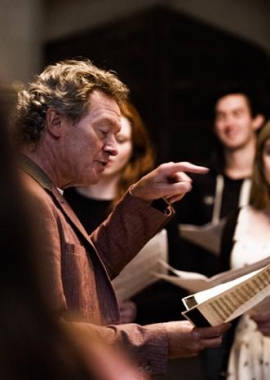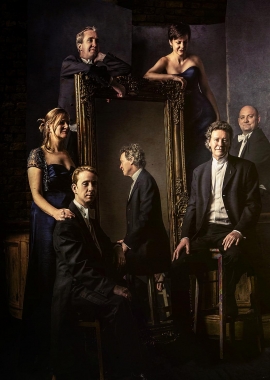Share This
Album at a Glance
Tags
Related Posts
- New American Choral Series: Music of Stephen Caracciolo / Cathedra Vocal Ens.; Michael McCarthy
- Alfred Bruneau: Requiem; Claude Debussy: Pelléas et Mélisande, Symphony / Ludovic Morlot
- Biber: Vespro della beata Vergine; Kerll: Missa in Fletu Solatium / Cantus Cölln
- Zelenka: Missa dei Patris; Confitebor Tibi Domine; Laudate Pueri
Giovanni Palestrina, Vol. 4 - The Sixteen; Harry Christophers
Posted by Paul Ballyk on Jan 19, 2014 in Renaissance | 0 comments
This is the fourth volume in the ongoing series by Harry Christophers and The Sixteen of some lesser known sacred music by Giovanni Pierluigi da Palestrina (1525-1594). The main work on the album is Palestrina's Missa O Magnum Mysterium, beautifully recorded by the choir's own record label, Coro, which has just over 100 titles on offer, almost all of them featuring The Sixteen.
With over 100 Masses and about 450 motets, sacred music was by far the greatest part of Palestrina's output. In addition to Missa O Magnum Mysterium, this Coro disc contains examples of the composer's hymns and motets, including the beautiful Marian Antiphon Ave Regina caelorum for double choir, an example of polychoral antiphony from the late Renaissance. The second portion of the album is given to a selection of secular madrigals from Palestrina's Song of Songs. Some of these appear liturgical enough, being based on Biblical texts while others are clearly secular on the subject of sensuous love and desire. The sample provided in the sidebar is the opening track on this album, the Kyrie from Missa O Magnum Mysterium. The video below has music from Palestrina's Gloria (which is not on this album), also performed by Harry Christophers and The Sixteen.
The music of Palestrina was described by Wagner as being timeless and spaceless, 'a spiritual revelation throughout'. With polyphony of utter purity, the Palestrina style has been a subject of study by composers for centuries. Long vocal lines flow in a continuous rhythm, imitative and with an original plainchant melodic motive for each phrase of the text. Melodies generally move in a stepwise motion with few leaps of intervals greater than a third, and those that do occur being immediately filled in by a step in the opposite direction. The result is an even, organic and graceful contour of sound with melodies from Gregorian chant being the very soil in which the music is rooted.
Recorded in January 2013 at the Church of St. Alban the Martyr in London, the recording has ambient warmth and the sound is ideally reverberated in the space. As an exponent of the music of Palestrina, Harry Christophers and The Sixteen have few rivals. The performances are wonderful, the music is divine, and is essential listening in order to have any sort of a long view of the history of Western music.
A towering figure in Renaissance polyphony, Palestrina is arguably one of the greatest composers of liturgical music of all time. Harry Christophers and The Sixteen continue their exploration of his work with the fourth disc in their celebrated series.
This album features a selection of Palestrina’s music for Christmas including his largely unknown masterpiece, the Missa O magnum mysterium. Also presented is the unusual hymn A solis ortu cardine—a setting of a chant hymn for Christmas morning. Among composers, Palestrina is unusual in setting this hymn for Lauds on the Feast of Nativity. Most composers reserved their efforts for the more important celebrations of Vespers. The text, written by Caelius Sedulius, is itself unusual in that the verses begin with successive letters of the alphabet.
Alongside the hymns are motets from the Song of Songs. The Song of Songs are among some of Palestrina’s most sublime and expressive works and, as with previous disc in the series, this album includes three of them. Dedicated to Pope Gregory XIII, Palestrina’s style of writing for these sensual texts demonstrates what variety and intensity of feeling can be conveyed with the simplest of means.
Completing this recording are three double-choir motets (a genre in which Palestrina was unsurpassed), Ave Regina, Iubilate Deo and Surge illuminare.
Source: The Sixteen
 Giovanni Pierluigi da Palestrina, composer |
Giovanni Pierluigi da Palestrina (c. 1525 – 2 February 1594) was an Italian Renaissance composer of sacred music and the best-known 16th-century representative of the Roman School of musical composition. He has had a lasting influence on the development of church music, and his work has often been seen as the culmination of Renaissance polyphony. |
| |
Richard Henry Tudor “Harry” Christophers Harry Christophers CBE is known internationally as founder and conductor of The Sixteen as well as a regular guest conductor for many of the major symphony orchestras and opera companies worldwide. He has directed The Sixteen choir and orchestra throughout Europe, America and the Far East gaining a distinguished reputation for his work in Renaissance, Baroque and 20th-century music. Harry Christopers, TheSixteen.com
|
|
After 34 years of worldwide performance and recording, The Sixteen is recognized as one of the world’s greatest ensembles. Comprising both choir and period-instrument orchestra, The Sixteen’s total commitment to the music it performs is its greatest distinction. A special reputation for performing early English polyphony, masterpieces of the Renaissance, bringing fresh insights into Baroque and early Classical music and a diversity of 20th and 21st-century music, is drawn from the passions of conductor and founder Harry Christophers CBE. Soprano: Emma Brain-Gabbott, Julie Cooper, Grace Davidson, Rebecca Hickey, Kristy Hopkins, Alexendra Kidgell, Charlotte Mobbs |
![]() About Paul Ballyk
About Paul Ballyk
all about Paul
Twitter •
| Thinking about purchasing this album?
Follow this link for more album details or to make the purchase. Buy it now |
“Not just recommended. Guaranteed.”
We stand behind every album featured on Expedition Audio. Our objective is to take the monetary risk out of music exploration. If you order this album from HBDirect.com and do not like it you can return it for a refund.






